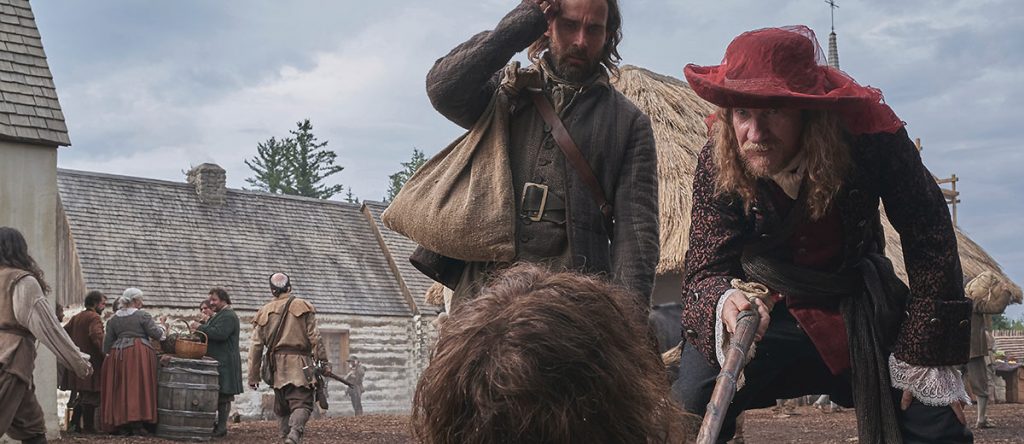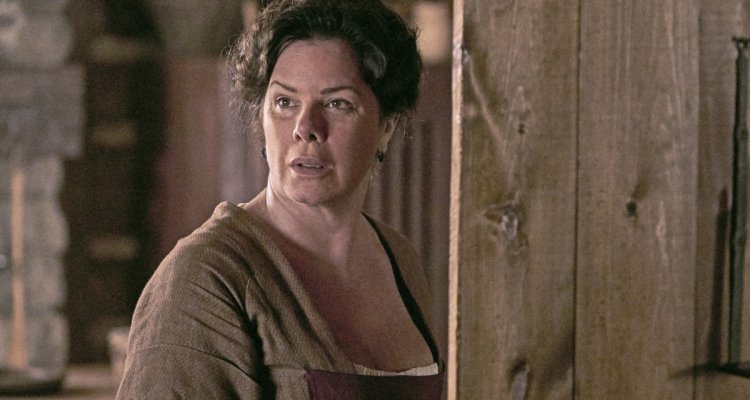A loose adaptation of Annie Proulx’s novel, “Barkskins” is a unique beast even in the era of Peak TV. Executive Produced by film and broadway uber-producer Scott Rudin, it was created and written primarily by Elwood Reed whose previous work (“The Chi,” “The Bridge,” “Hawaii Five-O”) don’t necessarily scream 17th century period piece set in the French Canadian wilderness. And the same can be said for filmmaker David Slade, who helmed the first two episodes of the series. But it’s an intriguing mix thanks to its cast which includes none other than Aneurin Barnard, Marcia Gay Harden, and Aneurin Barnard.
Harden, an Oscar-winner for “Pollock” almost 20 years ago, is no stranger to television having spent three years on the CBS procedural “Cold Case” and major roles in series such as “Newsroom” and “Trophy Wife.” Despite over three decades as a working actor, what she’s rarely experienced is a role that is contemporary or at least set in the latter half of the 20th century. In “Barkskins” she plays Mathilde Geffard, a (slight spoiler) widowed innkeeper who tries to protect a traumatized young woman from the clutches of various nefarious players in “New France.”
The Tony Award winner and two-time Emmy nominee took some time to speak about her work on “Barkskins,” which wrapped what was potentially its only season, last month.
_____
The Playlist: Marcia, how are you doing today?
Marcia Gay Harden: Hi, Greg. I’m great. How are you?
I’m great. Congratulations on the show. What made you say yes to this project?
Everything, actually. The genesis was knowing Annie Proulx’s work, having read her other work, and I was actually in the middle of reading “Barkskins.” I heard that the amazing team of Nat Geo, Elwood and Scott Rudin were making a series, and I thought, “I love this story. I’ve never heard anything like it, I’ve never seen this era, I don’t know this story.” My American education, unfortunately, didn’t really teach me much about New France and these [immigrants] and the fact of what they were escaping and what they were coming to. There was a lot about it that I really liked.
I know the book covers many generations and ends in contemporary times, but is Matilda a prominent character in the early part of it?
Not at all, she’s not in it. I knew there was a character, and I went back to the beginning to keep reading and thought, “Where the hell is this woman? Who is she?” Because in Annie Proulx’s telling, women really start showing up in the second generation. The story follows two indentured servants, basically. One who escapes and is canny and a rascal. And the other one who’s a real loyal, hardworking guy. And they go on to become the prototypes of white-collar and blue-collar workers basically. It’s following their story and you meet them right in the beginning. Then almost by page, I want to say, it’s a 700-page book. So let’s say by page 100, you’re onto the second generation, and then you’re onto the next generation and the next generation. And I could see some women in the fourth generation, but what Elwood has done just stays in this first generation in the late 1600s. He created this character and then as we spoke more, I think she just became more and more defined. I don’t think I understood, actually, that she would be such a ball-buster, right? She’s not tough, she’s learned how to protect herself and she does it really well. She seems to experience this whole second coming after her husband dies and it just gives her tons of freedom and she doesn’t want to follow the rules. All of this, you just discover playing it, because you think what were the standards and how is she moving away from the standards the husband represents. He wants the pretty linen table cloths and everything just like it was in France. We’re not in France, we’re not there anymore. We’re serving rough people, that’s what we do. So. she’s really practical and kind of jolly, and at times even crass. I loved that challenge because I don’t think that’s typical for me to play, to build and transform into that.
I saw her almost as a survivor as well. She’s made it all this far from whatever her life was in France and she’s just not going to put up with any crap, because she knows that she can do it. But did Elwood give you any backstory of what he thought her previous life had been back home?
No, actually not. So I figured that she had come from the North of France, because they make a really good prune tart in the North of France, and they’re famous for it. So, I was just trying to figure out how did she get into cooking and baking? If you were a cook if you were a baker if you had a position like that, why would you leave France? What was in it for her to move away and come all the way here? I could see the [single women’s reasons]. They would leave because most of them came from target backgrounds, and they’d been raped, they’d had kids out of wedlock, or they were extremely poor. They were hungry to get out, but then when you do the research, you realize there was just a pre-revolution, there was tons of unrest in France and people being targeted and disease and people thrown in piles and all the murders on the Nances river. It wasn’t such a peaceful life. I suspect they came upon some really hardcore striking disease. They heard about this new world and maybe she had a friend over there, so they came. She’s one of the people who’s been there the longest because I believe she had her child there. I believe she’s been there for at least 10 years. And as soon as the husband died, she was like, “Yeah, now I’m free.” And she says things about him that, “This other guy was groping me.” Did her husband protect her? No. He stood there quaking like a flower. So I think she has a sense of freedom and she lost a lot. She lost her child. She lost her husband, but she didn’t shed a big tear about that, did she?

No, she does not. I talked to David just earlier today and he said he had an idea regarding the fate of his character at the end of the series, but he didn’t know exactly what it was going to be because Elwood was still writing it as you were shooting. But Elwood had given him a slight idea of what would happen. Did you know where Matilda was going to end up with her arc?
No. There were three things that surprised me about the ending and that I hadn’t seen it coming. Obviously every great story is of the good and evil from the Bible to “Harry Potter,” right? It’s all the same, there’s huge evil forces and huge good forces. So, I had not seen that. And when he had that moment where he just literally throws all morality to the wind and becomes darker than he already is, that was one. I had no idea that David Thewlis would end up as the Jesus figure, be the second rising. And literally there was that crown of thorns because of the way they shot up through the tree. His head was encased in a crown of leaves and it was the most beautiful shot. And I don’t believe that was there in the description, right? Shooting through the tree, there’s a crown. It was a stunning shot and all of a sudden you went, “Oh, it’s the second rising shot,” because I thought Trepagny was a little bit evil, not evil, but he treats women horribly. But those two shots speak for themselves, whether in Elwood’s mind he’s pure or whatnot, it’s not for me to say. The shot itself said what it needed to say. I can’t see how Bouchard survives and I love him so much. I love that actor [David Wilmot], but he could be horribly wounded. You just don’t know. That’s the fun thing about a cliffhanger like that. I did not know that he would die in front of my eyes and I suspect, I don’t know, but I suspect if there’s a season two she’s pissed. She’s meaner and revengeful a little bit because of it.
The program is presented as a limited series, but it does feel like there’s so much more to be told. While you guys were shooting it, did you feel like this is something that could have a second or third season?
If it was talked about, it was talked about in halting sentences as any projected future for any television series is these days. That there’s more story to tell is uncontestable that it ended on a cliffhanger and you’re screaming at the TV, “No, no. That can’t be it!” There has to be a couple more episodes is uncontestable. There was supposed to be 10, he had to minimize it to eight because of weather issues. We weren’t prepared to shoot in the snow that Quebec has.
Oh wow.
He had to really cut out two hours, that’s a lot of storytelling, but still it’s a planned cliffhanger. And I felt at the end I wanted to know more about these characters. I want to go deeper and learn more about Matilda. I just want to know more about this world. So when we would talk about it, even still, it’s not a dumb thing that there’s a second season. I think all of that is so audience contingent and whether people find it interesting and want to tune in and talk about it, if it gets a buzz, that’s what it all is. And you go, “Really? The shit that’s on TV these days.” And they would have a question about this. This show is so cool, but you know, you know, you know, commerce, you know.
Before I let you go, I know you shot the comedy “Moxie,” Amy Poehler’s directorial debut for Netflix. Can you just say anything about it and what Amy was like as a director?
Well, Amy Poehler is just all-encompassing. She can do anything. And everything she does, she does with a smile. But don’t not take her seriously. She’s quite serious, but she is able to bring a harmony. She makes you feel good to be around her. And in this story, she was telling the story of girls who were just sick of sexism that’s inherent and rapid in high schools, and she’s telling their story. They start a little revolution and I play a very obtuse principal. But Amy, she listens, she’s not threatened at all by anybody so she can listen. She’s not defensive. And she’s just fun to be around. Very, very focused. Very, very focused..
The entire season of “Barkskins” is available on NatGeo’s streaming app.


